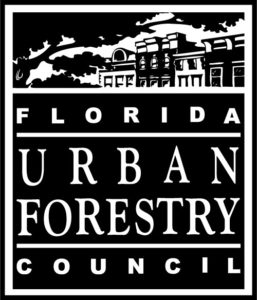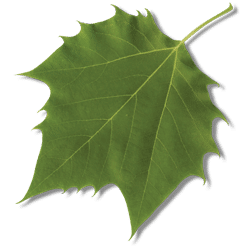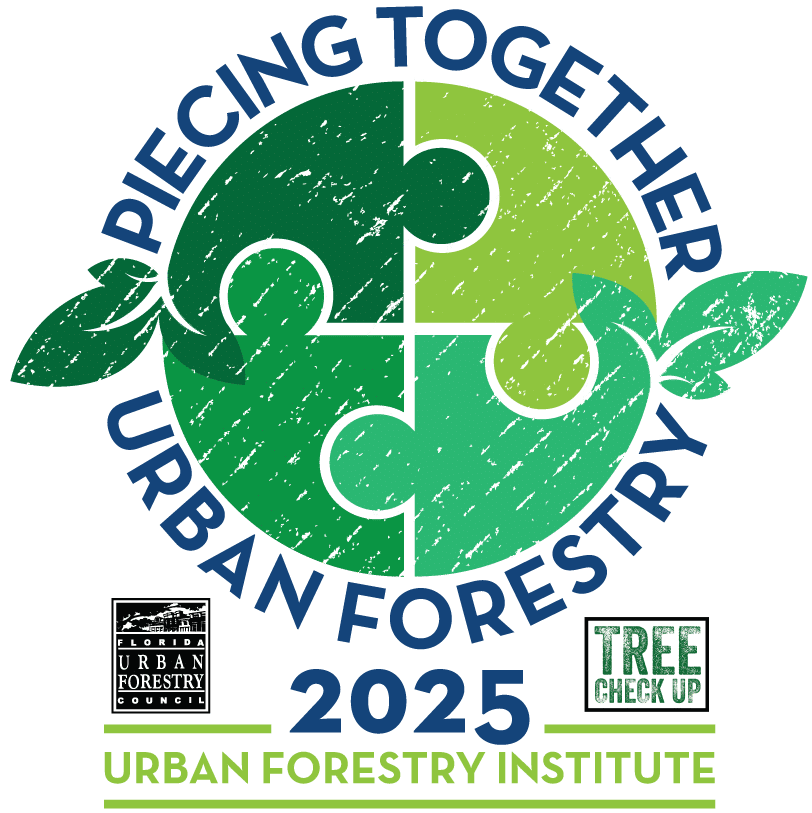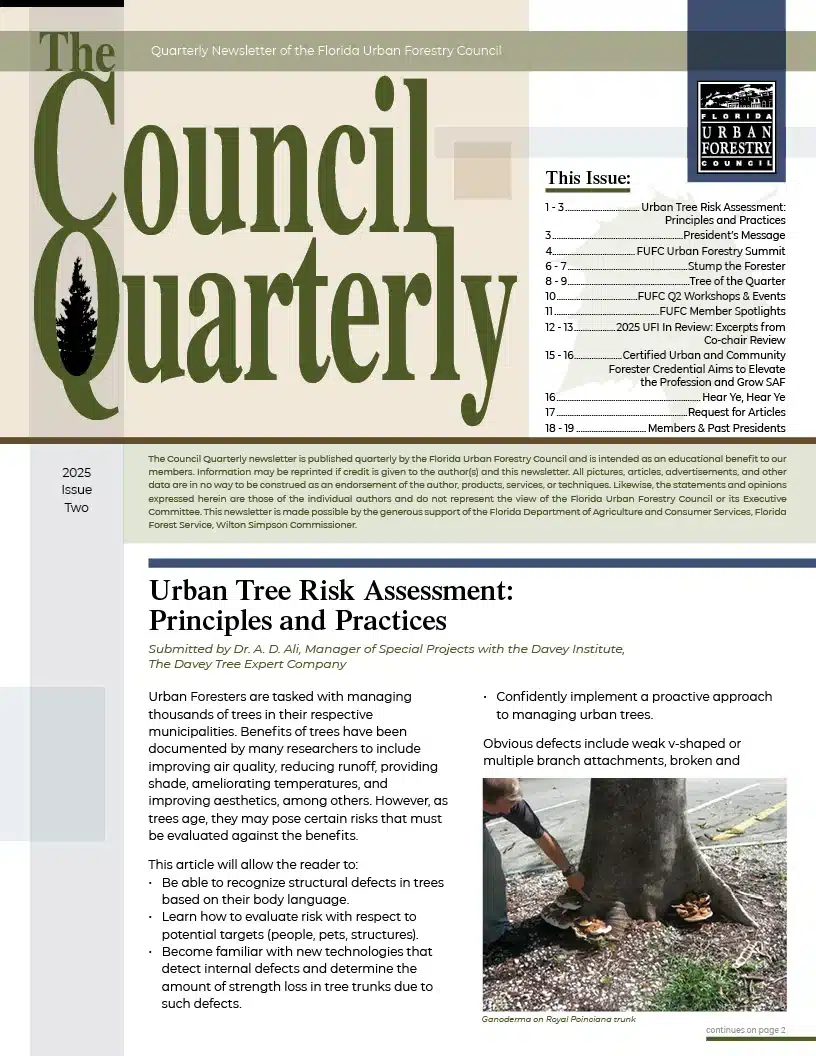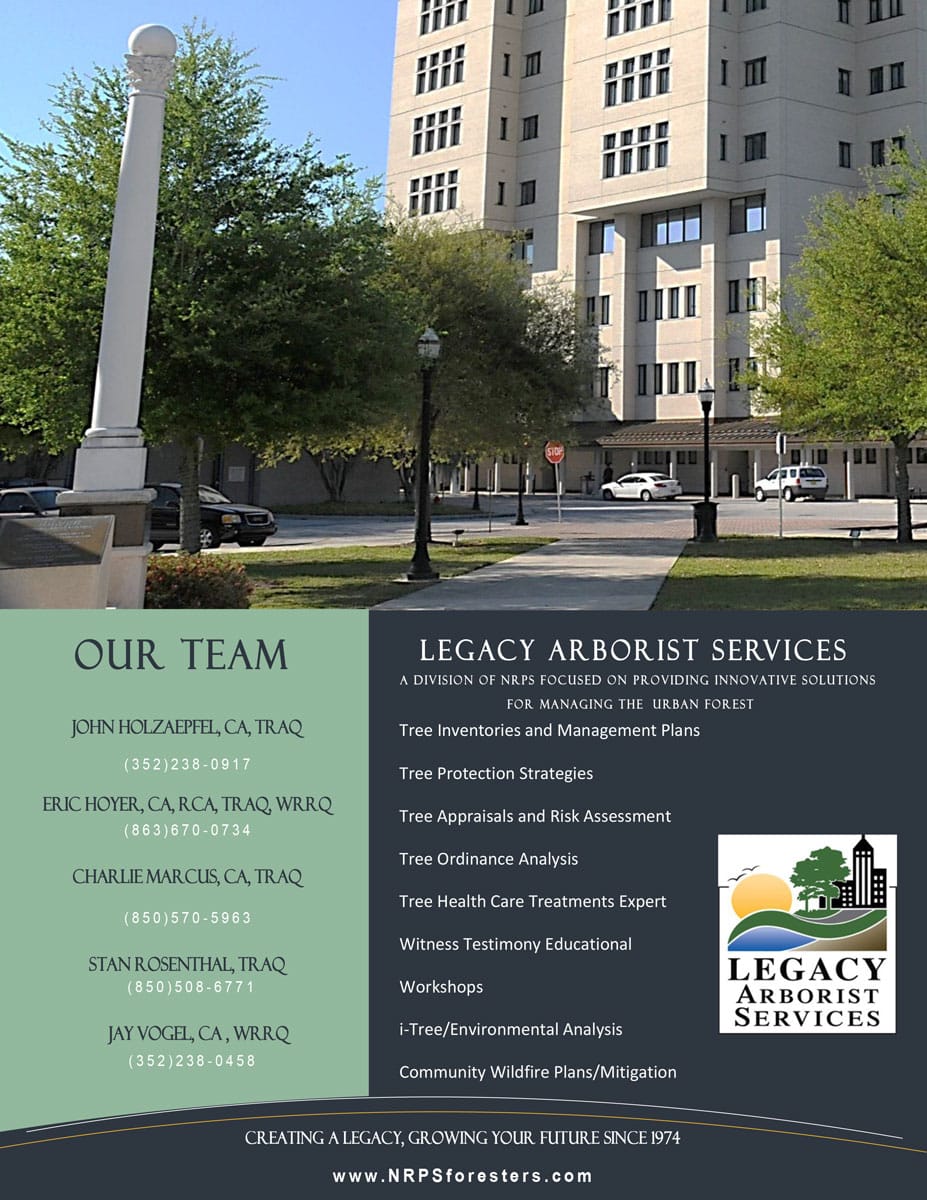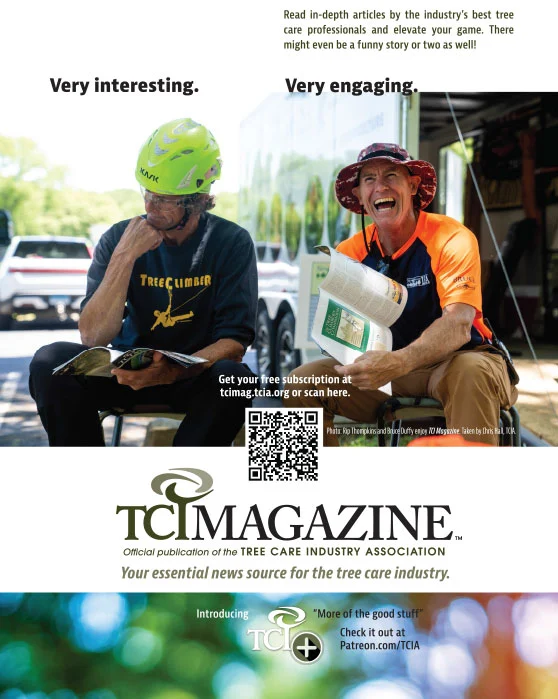In 2025, the Florida Urban Forestry Council (FUFC) continued a long-standing tradition with an annual Urban Forestry Institute (UFI) conference. The UFI provides affordable education for urban forestry professionals through a wide range of urban forestry topics. Leading organizations from Florida’s Urban Forestry community came together in conversation about Piecing Together Urban Forestry.
The UFI Program Committee and the FUFC Executive Board would like to thank all the presenters, participants, sponsors, exhibitors, and organizers behind the scene that made the UFI possible. The following excerpts provide a quick recap of the 2025 UFI.
The 2025 FUFC Urban Forestry Institute (UFI) virtual conference was held on March 12-14. On the 12th, John Snow, FUFC President and Master Arborist led the Arborist Accelerator Course. This course was a great way to review and prepare for the ISA Certified Arborist exam.
On Thursday the 13th, the FUFC Executive Board President, John Snow, kicked off the day addressing how FUFC partner organizations fit into the larger Urban Forestry puzzle in Florida. The President’s address was an invitation to join the FUFC and help make the FUFC and Florida Urban Forestry the best it can be.
Joe Anderson, FUFC Communication Committee Chair presented a brief history of the Urban Forestry Institute with the help of Stump the Forester and The Council Quarterly newsletter. Our first UFI conference was held in 2012, where Florida Urban Foresters came together for camaraderie, education, a bit of fun, and to discuss the S.O.A.P. (Staff, Ordinance, Advocacy, Plan) concept.
Next, the Florida ISA “Prescription Pruning Qualification” was introduced by Dr. Ed Gilman. I recently participated in a PPQ class. I cannot speak highly enough about the proactive communication and advanced pruning techniques.
Rebecca O’Hara, representing The Florida League of Cities introduced the Municipal Home Rule and Legislative Preemption introduced to the Florida Constitution in 1968. Though there are restrictions and preemptions that limit a city’s ability to full autonomy, cities are not dependent on the legislature for authority to act and to set policy.
Omar Leon, Urban Forester provided a brief history of Cape Coral, and provided some suggestions for developing partnerships as you plan and fund an Urban Forestry Program.
Next, the UFI heard from John Harris – FNGLA representative who explained details about the Florida Nursery, Growers and Landscape Association (FNGLA) 10 professional certifications and three areas of apprenticeships.
The UFI continued as UF Extension Service agents, Tia Silvasy and Tina McIntire presented on UF/IFAS Florida-Friendly Landscaping™ (FFL) nine core principles, to include “right-plant, right-place.” The presentation highlighted plants to consider when landscaping. You can get more information from the UF/IFAS FFL website.
If you ever wanted to know more about how the Florida Dept of Transportation (FDOT) determines tree planting locations, the next presentation was for you! Darryl Richard – FDOT Landscape Architect, and Immediate Past President for FUFC, shed some light on the topic.
The Society of American Foresters (SAF) followed with Erin Turner – credentialling director for SAF with a brief history of the organization and details about professional certifications available from the organization. The most recent SAF Certified Urban and Community Forester Program (CUCFP) was discussed.
Day two started off with Richard Durr, Director of the Seminole County Parks and Recreation Department, and President of the Florida Recreation & Parks Association (FRPA) reminding us that we are in the quality-of-life business together. The presentation stressed the importance of a holistic approach to urban park planning; collaborating with partners; thinking of parks as a system; and increasing park lands & opportunities.
Next, the UFI heard from the three urban forestry UF/IFAS extension agents (Alyssa Vinson, Larry Figart, and Jamielyn D. Hagyari). They highlighted scope of UF/IFAS Extension Service; Urban Forestry Extension Council; specialized audiences; and programing – citizen pruning; ISA Prep Classes; CEU classes; ordinance writing; planning and working groups; specific municipal outreach; and plant diagnostics.
Urban Forestry researchers at UF were introduced – Dr. Andrew Koeser, Dr. Ryan Klein, Dr. Mica McMillan, Dr. Braham Dhillon, Dr. Michael Andreu, Dr. Brian Bahder. You can participate in a programming survey.
Student Presentations followed with Suzie Suhendy, Ph.D. Student at the University of Florida and recent recipient of the John P. White scholarship, who shared her research regarding the specific benefits of urban trees to human health. Results indicated a potential connection to the 3-30-300 rule for green spaces.
Teagan Young is also a Ph.D. student at the University of Florida. Teagan gave us an overview of possible changes to climate across Florida impacting several areas, including our urban forests. Her study focuses on the issue of underwatering newly planted trees.
James Rose, a researcher for FUFC, sampled 265 city and county ordinances, created 27 indicators for analysis, discussed codifying a tree ordinance, the importance of universal definitions, and provided vital insight to issues in tree ordinances across the state.
Student presentations were followed by Joe Anderson, Veg. Mgt Specialist with JEA (Jacksonville, FL utility provider) brought information about utility arboriculture, integrated vegetation management, urban forestry, storm response, line-friendly tree list, Tree-Line-USA program, and the balance of several priorities including safety, service reliability, tree health, and aesthetics.
Next, Dr. Robert Raze brought us information about Florida Project Learning Tree (FPLT). Florida’s Project Learning tree is part of the sustainable forestry initiative education program. Dr. Raze took time to review several curriculum options and a wide variety of programming for PLT professional development.
Todd Little, Urban Forest Coordinator for the Florida Forest Service concluded with the final presentation, detailing the S.O.A.P. (Staff, Ordinance, Advocacy, Plan) initiatives when building a municipal urban forestry program, and how S.O.A.P. is used to keep your urban forests clean…I mean well managed. FFS is here to support our programs across the state.
John Snow, FUFC President provided a brief farewell address and invitation to join the 2026 UFI.
